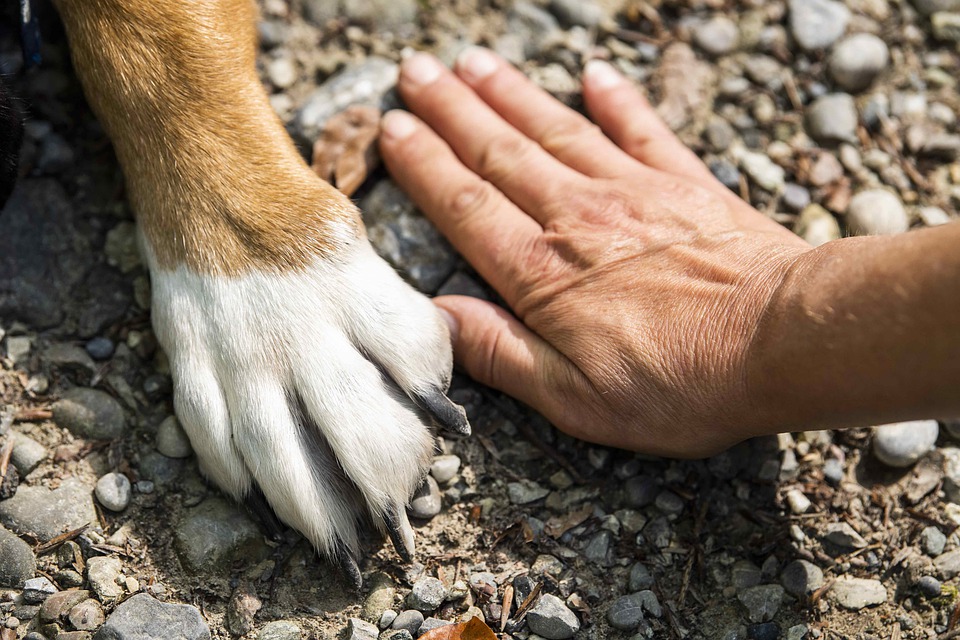A key finding of a new research conducted by a team at Azabu University, Japan has reckoned that Dogs became ‘man’s best friend’ because of a gene that lowered their stress and made them more relaxed around people.
Widely believed to have descended from wolves, the domestication of dogs which enabled their special relationship with humans has baffled evolutionary experts for decades only to be decoded by the new research.
Join our WhatsApp ChannelThe Japanese team said, dogs carry two mutations of a gene known as MC2R (melanocortin 2 receptor), which produces the hormone cortisol—nature’s built in alarm system released during fear or anxiety.
According to the research: “Dogs’ emergence has been tracked back to wolves scavenging leftovers discarded by early humans on the edges of settlements. Over generations, their offspring became bolder and moved ever closer to the people they relied on.”
In time, humans saw the animals as natural allies and began training them to be better hunters and herders.
“It may have become necessary through the process of domestication for dogs to gaze at humans for instruction and initiate communication to build a more successful relationship,” said the team lead, Dr. Miho Nagasawa.
Nagasawa said: “Because stray dogs that are not brought up in human households show this characteristic, it has been previously suggested there is a genetic component involved. Our results support this hypothesis.”
To investigate the phenomenon, Dr. Nagasawa and colleagues ran experiments in which 624 domestic dogs were split into ancient and modern (general) breeds.
The ancient group consisted of those considered genetically closer to wolves such as the Akita and Siberian Husky. Others, such as gun dogs, mastiffs and Jack Russell terriers, are more distantly related. All participants were recruited voluntarily from their owners.
They found the ancient group felt less attached to the testers than the latter, and it was due to the MC2R variants.
“We focused on ancient dog breeds to investigate breed related differences in social cognitive abilities,” explained Nagasawa.
“In a problem solving task, ancient breeds showed a lower tendency to look back at humans than other European breeds.”
- Queen Nwabueze
- Queen Nwabueze
- Queen Nwabueze
- Queen Nwabueze
- Queen Nwabueze
- Queen Nwabueze
- Queen Nwabueze
- Queen Nwabueze
- Queen Nwabueze
- Queen Nwabueze
- Queen Nwabueze
- Queen Nwabueze
- Queen Nwabueze
- Queen Nwabueze
- Queen Nwabueze
- Queen Nwabueze
- Queen Nwabueze
- Queen Nwabueze
- Queen Nwabueze
- Queen Nwabueze
- Queen Nwabueze
- Queen Nwabueze
- Queen Nwabueze
- Queen Nwabueze
- Queen Nwabueze
- Queen Nwabueze
- Queen Nwabueze
- Queen Nwabueze
- Queen Nwabueze
- Queen Nwabueze
- Queen Nwabueze
- Queen Nwabueze
- Queen Nwabueze
- Queen Nwabueze
- Queen Nwabueze
- Queen Nwabueze
- Queen Nwabueze
- Queen Nwabueze
- Queen Nwabueze
- Queen Nwabueze
- Queen Nwabueze
- Queen Nwabueze
- Queen Nwabueze
- Queen Nwabueze
- Queen Nwabueze
- Queen Nwabueze
- Queen Nwabueze
- Queen Nwabueze
- Queen Nwabueze
- Queen Nwabueze
- Queen Nwabueze
- Queen Nwabueze
- Queen Nwabueze
- Queen Nwabueze
- Queen Nwabueze
- Queen Nwabueze
- Queen Nwabueze
- Queen Nwabueze
- Queen Nwabueze
- Queen Nwabueze
- Queen Nwabueze
- Queen Nwabueze
- Queen Nwabueze
- Queen Nwabueze
- Queen Nwabueze
- Queen Nwabueze
- Queen Nwabueze
- Queen Nwabueze
- Queen Nwabueze
- Queen Nwabueze
- Queen Nwabueze
- Queen Nwabueze
- Queen Nwabueze
- Queen Nwabueze
- Queen Nwabueze
- Queen Nwabueze
- Queen Nwabueze
- Queen Nwabueze
- Queen Nwabueze
- Queen Nwabueze
- Queen Nwabueze
- Queen Nwabueze
- Queen Nwabueze
- Queen Nwabueze
- Queen Nwabueze
- Queen Nwabueze
- Queen Nwabueze
- Queen Nwabueze
- Queen Nwabueze
- Queen Nwabueze
- Queen Nwabueze
- Queen Nwabueze
- Queen Nwabueze
- Queen Nwabueze
- Queen Nwabueze
- Queen Nwabueze
- Queen Nwabueze
- Queen Nwabueze
- Queen Nwabueze
- Queen Nwabueze
- Queen Nwabueze
- Queen Nwabueze
- Queen Nwabueze
- Queen Nwabueze
- Queen Nwabueze
- Queen Nwabueze
- Queen Nwabueze
- Queen Nwabueze
- Queen Nwabueze
- Queen Nwabueze
- Queen Nwabueze
- Queen Nwabueze
- Queen Nwabueze
- Queen Nwabueze
- Queen Nwabueze
- Queen Nwabueze
- Queen Nwabueze
- Queen Nwabueze
- Queen Nwabueze
- Queen Nwabueze
- Queen Nwabueze
- Queen Nwabueze
- Queen Nwabueze
- Queen Nwabueze
- Queen Nwabueze
- Queen Nwabueze
- Queen Nwabueze
- Queen Nwabueze
- Queen Nwabueze
- Queen Nwabueze
- Queen Nwabueze
- Queen Nwabueze
- Queen Nwabueze
- Queen Nwabueze
- Queen Nwabueze
- Queen Nwabueze
- Queen Nwabueze
- Queen Nwabueze
- Queen Nwabueze
- Queen Nwabueze
- Queen Nwabueze
- Queen Nwabueze
- Queen Nwabueze
- Queen Nwabueze
- Queen Nwabueze
- Queen Nwabueze
- Queen Nwabueze
- Queen Nwabueze
- Queen Nwabueze
- Queen Nwabueze
- Queen Nwabueze
- Queen Nwabueze
- Queen Nwabueze
- Queen Nwabueze
- Queen Nwabueze
- Queen Nwabueze
- Queen Nwabueze
- Queen Nwabueze
- Queen Nwabueze
- Queen Nwabueze
- Queen Nwabueze
- Queen Nwabueze
- Queen Nwabueze
- Queen Nwabueze
- Queen Nwabueze
- Queen Nwabueze
- Queen Nwabueze
- Queen Nwabueze
- Queen Nwabueze
- Queen Nwabueze
- Queen Nwabueze
- Queen Nwabueze
- Queen Nwabueze
- Queen Nwabueze
- Queen Nwabueze
- Queen Nwabueze
- Queen Nwabueze
- Queen Nwabueze
- Queen Nwabueze
- Queen Nwabueze
- Queen Nwabueze
- Queen Nwabueze
- Queen Nwabueze
- Queen Nwabueze
- Queen Nwabueze
- Queen Nwabueze
- Queen Nwabueze
- Queen Nwabueze
- Queen Nwabueze
- Queen Nwabueze
- Queen Nwabueze
- Queen Nwabueze
- Queen Nwabueze
- Queen Nwabueze
- Queen Nwabueze
- Queen Nwabueze
- Queen Nwabueze
- Queen Nwabueze
- Queen Nwabueze
- Queen Nwabueze
- Queen Nwabueze
- Queen Nwabueze
- Queen Nwabueze
- Queen Nwabueze
- Queen Nwabueze
- Queen Nwabueze
- Queen Nwabueze
- Queen Nwabueze
- Queen Nwabueze
- Queen Nwabueze
- Queen Nwabueze
- Queen Nwabueze
- Queen Nwabueze
- Queen Nwabueze
- Queen Nwabueze
- Queen Nwabueze
- Queen Nwabueze
















